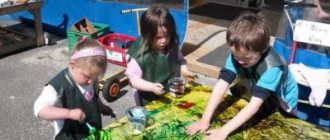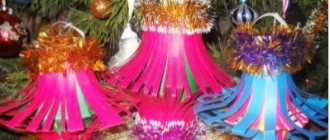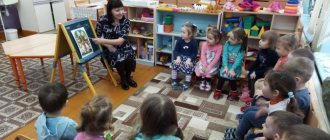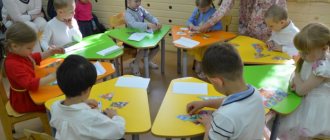Attention! Promotion until January 14!
Author: Diveeva Galina Aleksandrovna Program content: To form the idea that the Constitution of the Russian Federation is the basic law of the state that must be observed. Introduce children to some of the rights and responsibilities of people. Develop a cognitive interest in your country and its laws. Foster a desire to know and comply with the laws of the Russian Federation. Activate children's knowledge about their Motherland, its symbols and anthem.
Introductory part (motivation) Guys, do you like holidays? Name what holidays you know. Yes, well done, you know many holidays, but in our country there is one more holiday. Main part 1). (fairy-tale character grandmother enters) Grandmother: “I came to you from a fairy-tale kingdom. All the heroes of fairy tales live in our kingdom and we all lived very peacefully, amicably, cheerfully, no one offended anyone. And all this is due to the fact that there was a big magic book in this Kingdom - the Book of Laws, which taught all the fairy-tale inhabitants how to live correctly, how to resolve disputes, and act fairly. Everything was fine, but the Evil Witch did not like that the fairy-tale people lived calmly and peacefully. She stole the Book of Laws, and the fairy-tale country turned into the “Kingdom of Lawlessness...”, and now we don’t know how to live further 2) Dear grandmother, we will try to help you, right, children? For now, sit down and relax, and the children and I will think about how to help you. Guys, how do we live in our country? Do we have such a magical book - the Book of Laws? Which teaches people how to live correctly, how to resolve disputes? Yes, we have such a book and it’s called the Constitution. But first, let's remember the name of our country in which we live. 3) Conversation about Russia. -Children, what is the name of our country in which we live? (Russia) - That's right, this is Russia. – How can you see the whole country at once? (On the globe, on the map) Let's look at the map, what is our Russia like? (Big, beloved, beautiful, huge, rich, strong).
Leva 1. If we fly for a long, long, long time on an airplane, If we look at Russia for a long, long, long time, Then we will see both forests and cities, Ratmir 2. Ocean expanses, Ribbons of rivers, lakes, mountains... We will see the endless distance, the Tundra, where spring rings, And then we will understand what a big, vast country our Motherland is.
— No country in the world has such a vast territory as Russia. (The teacher shows the children a map of Russia) - What is the name of the main city of the country? — Name the capital of Russia. - Who knows who the president of our country is... (V. V. Putin). 4) Conversation about state symbols. — Every country on earth, every state has its own symbols. -Name them? Why do we need them? (to be different from other countries) (Coat of arms, flag, anthem). – Name the colors of the flag of our country (Children’s answers). The Russian flag looks like this:
White color - for the Fatherland Blue color - Loyalty Red color - Courage, battle for faith.
– The next symbol of each country is its coat of arms. – What is depicted on the coat of arms of the Russian Federation? The double-headed eagle was and remains a symbol of power, supremacy, strength, and wisdom. On the Russian coat of arms, crowns can be interpreted as symbols of the three branches of government - the executive, legislative crown and judicial. A scepter is a pointing rod, or a cane, or a staff. In ancient mythology, the supreme deity had a scepter. The power is a ball with a cross - a symbol of the king’s power over the world. Previously, the state was called the “sovereign apple.” The horseman slaying the dragon on the eagle’s chest with a spear is the coat of arms of Moscow - St. George the Victorious. This is a symbol of the struggle between good and evil.
The national anthem is a solemn song of praise dedicated to the Motherland. The anthem is exactly the same symbol of the state as the coat of arms or flag, but unlike the coat of arms and flag, the anthem can not only be seen, you can also hear or sing it yourself. Now guys, I invite you to listen to the anthem of our country. When the anthem sounds, all people should stand up and listen to it only while standing. The Russian Anthem is playing Well, we remembered what our country is like, and now remember at the beginning we talked about holidays and I wanted to tell you that we have another holiday and it’s called “Constitution Day.” The Constitution of the Russian Federation was adopted on 12 December in 1993 and this day became a holiday for all people because people knew that they were protected, that no one would offend them, and if someone breaks the law, they will be punished. According to the laws of this constitution, adults and young children have many different rights and responsibilities. What is the Constitution? The guys know a poem about the Constitution.
Sasha Neg. Already many years ago As people tell us. The country created a law called the Constitution.
R. Nastya And since then, people have been honoring Him year after year. Being friends with the constitution means living according to the law! The Constitution of the Russian Federation is the most important law of the country, which describes all the rights and obligations of citizens of the country. Everyone, the president, adults and children, must abide by it. Let's listen to a wonderful poem about human rights. Christina O. Adults and children have rights: Play and learn, dream and work. Help the old man and pet the kitten, And wash with clean water at dawn. Christina I. A child has the right to happiness, and also to take refuge in the house in bad weather. The child has the right to walk and breathe clean air with his whole chest. Every person has the right to work, rest, and education. In order for there to be peace, all the people of our country must work conscientiously, take care of our Motherland, and protect it from enemies.
The Constitution says: Everyone has the inalienable right to life. This means you can't kill anyone. The Constitution says: Personal dignity is protected by the state. Nothing can be a reason to belittle him. This means that you have no right to torture or humiliate anyone. The Constitution says: Everyone has the right to housing. Everyone should have their own home. All people have the right to the name that their parents gave them, but no one has the right to call a person other, offensive names. And of course, all people have the right to rest, and you and I will now take advantage of this right and rest, have a little physical exercise. Physical education lesson 1) There is a pine tree in the yard, it reaches towards the sky. Poplar grew up next to her, he wants to be more authentic. (Standing on one leg, we stretch - arms up, then the same, standing on the other leg.) A strong wind blew, all the trees swayed. (Tilts the body back and forth.) The branches bend back and forth, The wind shakes them, bends them. (Jerks with arms in front of the chest.) Let's squat together - One, two, three, four, five. (Squats.) We warmed up from the heart and rush to the place again. (Children go to their seats.)
2) Once again we have a physical education session. We bent down, come on, come on! They straightened up, stretched, and now they bent back. We stretch our arms and shoulders, To make it easier for us to sit, To write, read, count, And not get tired at all. My head is tired too. So let's help her! Right and left, one and two. Think, think, head. Although the exercise is short, we rested a little. The Constitution says: Everyone has the right to education. (show picture) Now you have the right to go to kindergarten, then you will go to school, and after school to college. You guys must also follow the laws of our country - study diligently, protect nature, follow the rules of behavior in public places. You are the oldest kindergarten students and know quite well what is good and what is bad. I offer you the game “What is good and what is bad.” (showing a multimedia presentation) Final part Guys, let's now remember once again what the Constitution is? Nikita S. It is in the UN Convention Here is such a simple law: All children must be taught, Children need knowledge. All children and all people on the planet should know this.
Children, let's give our Constitution to our guest, along with these pictures, so that the inhabitants of the fairy-tale kingdom can have a peaceful, friendly life again.
Educator: Guys, now I suggest you color the flag of our state. You guys are great! This concludes our conversation. Today you learned about your rights. What is your main responsibility? (Study well.)
occupation.docx
The tasks of patriotic education of children in preschool educational institutions
The tasks of patriotic education in preschool educational institutions are quite multifaceted. They expand and become more complex as preschoolers grow up, their thinking develops, as well as the gradual formation of the correct attitude towards the surrounding reality, relatives and strangers, and moral feelings.
Objectives of moral and patriotic education in kindergarten:
- To instill in children a love for the Motherland - their native country, its historical milestones, cultural values and traditions.
- To form an idea of the main symbols of Russia: the State Emblem, the State Anthem, the State Flag; teach to understand the meaning of the main elements of state symbols.
- Gradually expand the knowledge of preschoolers about Moscow - the main city of the Russian Federation, about the main attractions and memorable places of the capital.
- Enrich knowledge about the small homeland - the native land: about the origin and meaning of the name of the native city / village / town, about its beautiful corners and attractions, about places of military glory, about nature and people.
- Instill socially useful work skills; to form an idea of work as an important spiritual value for every person; Encourage children's desire to be useful and help other people.
- Cultivate respect for parents and other relatives, awaken interest in family traditions and moral values, family history.
- To introduce the peculiarities of national culture and traditions based on works of fiction and art, folklore, and the work of folk craftsmen.
- To form in preschoolers an understanding of the main national holidays.
- Talk about the Russian army, about the soldiers guarding the Motherland, about military professions (pilots, border guards, tank crews, sailors), about military equipment.
- To cultivate respect for the defenders of the Fatherland, for the memory of the soldiers who died for the Motherland.
- Develop civic-patriotic feelings, interest in events taking place in the country, and historically significant dates.
- To form in pupils a sense of pride for the successes of their Fatherland, for its power, natural resources; to form an understanding of the importance of work for the benefit of the Motherland.
- Instill respect for the people who glorified Russia: military heroes, cosmonauts, scientists, writers, artists.
- International education. Formation in preschoolers of interest and friendliness towards people living in other countries.
The tasks of patriotic education in kindergarten are solved comprehensively, taking into account the age characteristics of preschoolers, in a fun way that awakens interest and curiosity. The methods of moral and patriotic education in preschool educational institutions are diverse: verbal, playful, practical, visual.
Means of developing patriotic feelings in children are fiction, music, visual arts, excursions around their hometown/town/village, exciting games, creativity, feasible joint work, preparation for the holidays.
The main goal of patriotic education of children in preschool educational institutions
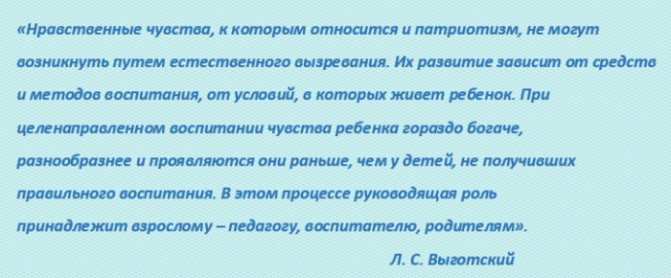
The main goal of moral and patriotic education in children's educational institutions of all types is the formation and development of patriotic feelings in children: love for their country, native land, their natural resources, culture, history, moral values, national and family traditions, people. In the process of growing up and accumulating knowledge about the Motherland, the life of society, nature and the work of people, these feelings are formed in growing children step by step.
